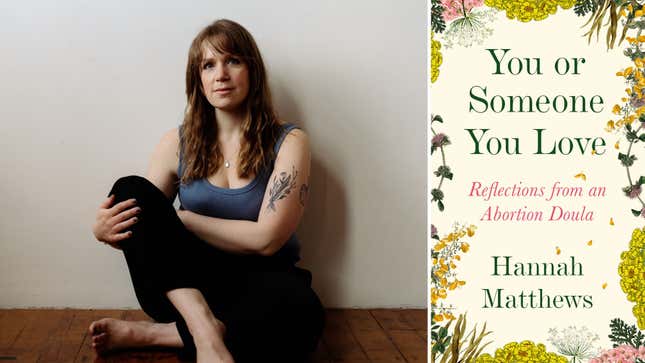Abortion Can Be an Act of Parenting
“No amount of love and desire for the fetus will relieve its future suffering... So River has made an appointment," abortion doula Hannah Matthews writes.
BooksEntertainment

The following is an excerpt from You or Someone You Love: Reflections from an Abortion Doula by Hannah Matthews, an abortion doula based in Maine. Matthews defines an “abortion doula” as “someone who supports you—physically, emotionally, spiritually, practically, and logistically—through your abortion… The work of an abortion doula can be done, in one form or another, by anyone, no matter how stretched thin across jobs and obligations and methods of survival.” Out Tuesday, her book is emotional, full of pathos, and highlights how abortion makes possible all the wonders of life. You can buy it at Bookshop and Amazon.
As an abortion doula and care worker, I often support people through ending pregnancies they don’t want, but River is a client of mine who does want their pregnancy, and they want it very, very badly.
A fetal anomaly renders that pregnancy unable to survive, which they and their partner have just learned at 20 weeks. After an anatomy scan, River is told that the anomaly is virtually guaranteed to create a life that wanting cannot save. The love that River feels for the fetus growing inside their body is real and overwhelming. But no depth, no volume, no amount of love and desire for the fetus will relieve its future suffering, or prolong its brief and agonizing time on earth. So River has made an appointment, devastated, distraught, swallowed whole by anticipatory grief.
We communicate via text message and phone call, mostly. They cry and cry on the other end of the phone. It is 2020, and our state is awash in its first wave of covid infections. No one is allowed to accompany River to their appointment, not even their partner, and they sit alone in the clinic waiting room, staring down the barrel of a panic attack. Their grief and anxiety—descending alongside the nausea and the intense hormonal shifts that occur in any pregnancy—are threatening to bury them alive, they tell me.
Were I sitting next to them, in this moment, I would ask to rub River’s back. I would offer my hands for them to squeeze. I would breathe deeply with them. I would talk them through the ebbs and flows. But, from my little apartment on the other side of town, I can only give them words. So I do. I tell them how proud I am that they are already a parent and a damn good one at that. I tell them what a loving and powerful act of parenting this is—to make this personal sacrifice, and take on this pain, to prevent the suffering of the being that would have become their child. I do a little mantra with them, one I first learned from a doula of my own, though she likely wouldn’t have called herself that at the time.
“You are the deep blue ocean,” my doula-who-was-not-a-doula said to 26-year-old me, and I hear my 34-year-old self say it to River in turn. “You are not the crashing wave.”
“You are not the crashing wave,” my doula-who-was-not-a-doula repeated, reversing the order of the statements as she brushed a strand of sweaty hair away from my temple. “You”—she kissed each cheek, and folded me tightly into her arms—“are the deep blue ocean.”
-

-

-

-

-

-

-

-

-

-

-

-

-

-

-

-

-

-

-

-

-

-

-

-

-

-

-

-

-

-

-

-

-

-

-

-

-

-

-

-








































